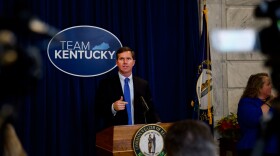In February, the city's chief financial officer briefed Metro Council on a surprisingly good revenue forecast that would offset the crush of the rising pension bill that forced $25 million in cuts last year.
Then coronavirus happened.
Now Daniel Frockt is coming up with new projections for Louisville. With three weeks to go until Mayor Greg Fischer presents a tentative budget to council, Frockt said a shortfall is likely for the current fiscal year and the new one starting on July 1.
"There's a great deal of uncertainty," he said on a call with reporters Thursday. "We don't know the economics of it. We also don't know the science, when we might be able to move about and kind of resume normal business and leisure activities."
Part of what puts Louisville in a vulnerable position is its tax structure. About a quarter of the city's general fund budget comes from property taxes and about 11 percent comes from net profits.
But nearly half of of Louisville's revenue -- about $300 million of the $625 million budget -- comes from occupational license fees, which is based on wages.
With so many people out of work because of the pandemic, that revenue stream will take a hit. Last week, nearly 113,000 Kentuckians filed for unemployment.
Two recent analyses by the Brookings Institution shed light on Louisville's economic vulnerability to the pandemic, with one suggesting the city's reliance on wage-based tax revenue puts it in a riskier position short-term. The other report pointed to leisure and hospitality jobs as among those most likely to be affected by the crisis. It said more than 16 percent of local jobs are in such high-risk categories.
Frockt said the city will most likely draw from its rainy day fund to ease the transition to the next fiscal year. At the end of the last fiscal year, that fund was nearly $71 million, which is already lower than what he said would be a healthy funding level for Louisville.
Some actions on the federal level are affecting the budgeting process as well, such as pushing back the tax filing deadline from April 15 to July 15 -- which puts it in the next fiscal year -- and the uncertainty of whether cities can expect more federal funds.
Some local revenue will also be shifted to the next fiscal year as, for example, people wait for county clerk offices to reopen. Other revenue, from sources such as zoo visits, will be lost altogether, he said.
Frockt said he is still working to determine the size of those revenue shifts. But he said the structural effect will make this fiscal year look worse than it is, whereas the next fiscal year will appear to be better. Then, down the line, the fiscal year ending in June 2022 will look relatively worse compared to the middle year.
Adding to the complexity of the situation is the uncertainty of when the pandemic will subside and the costs Metro will have until then. Already, the city has spend about $3 million on its COVID-19 response, which includes personnel and overtime, the purchase of personal protective equipment and an expanded meals program for seniors, he said.
Frockt said he believed most of those expenses would be reimbursed by by federal funds, though the rules around that are still being finalized.
One moment of relief for the city's budget going forward is that the state budget passed by the legislaturewill freeze next year's pension rate at this year's level, he said. That means that it won't increase 12% as anticipated, a savings of just under $12 million.
Frockt did not specify what other measures the city may take to balance its books, including employee furloughs or budget cuts. But he said he hasn't seen any forecasts that will put Metro's budget back to the level it was a month ago.
"Likely, we're going to have to size our budget to the revenue resources that we have," he said






